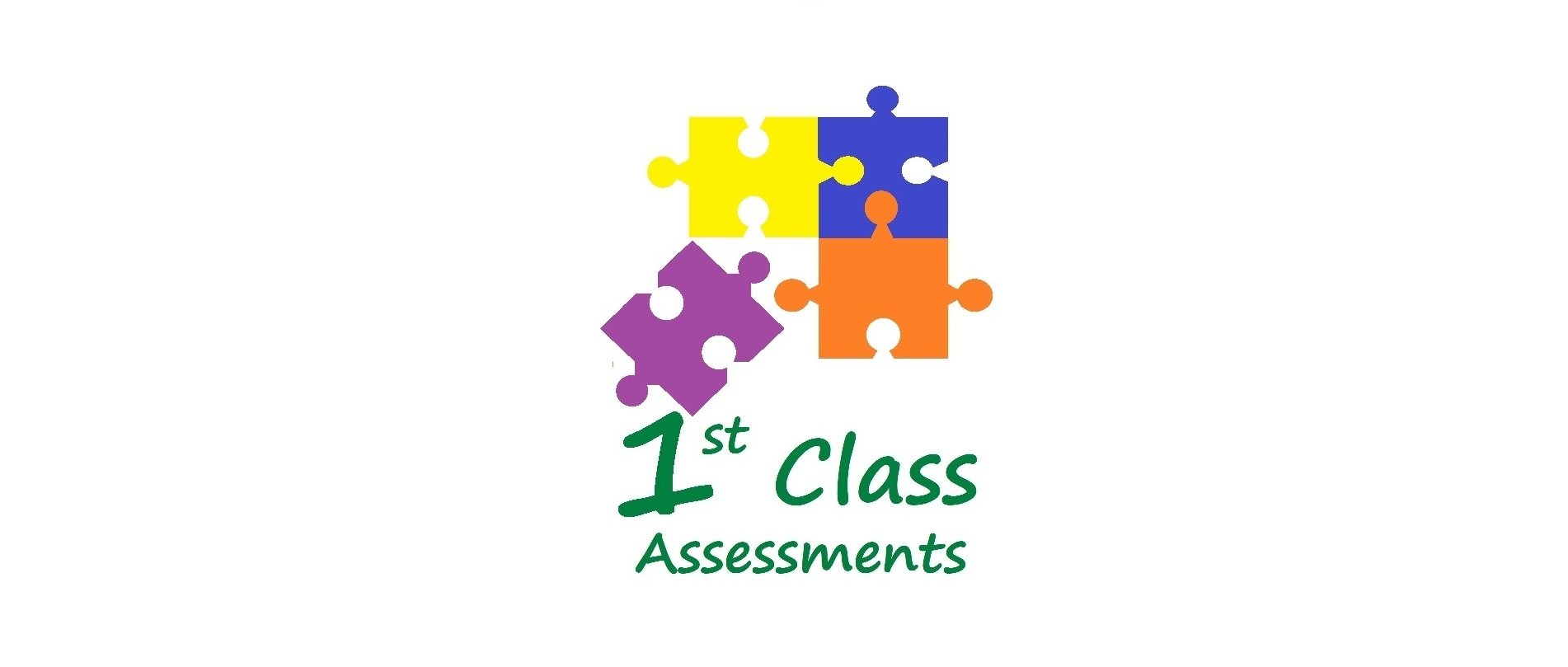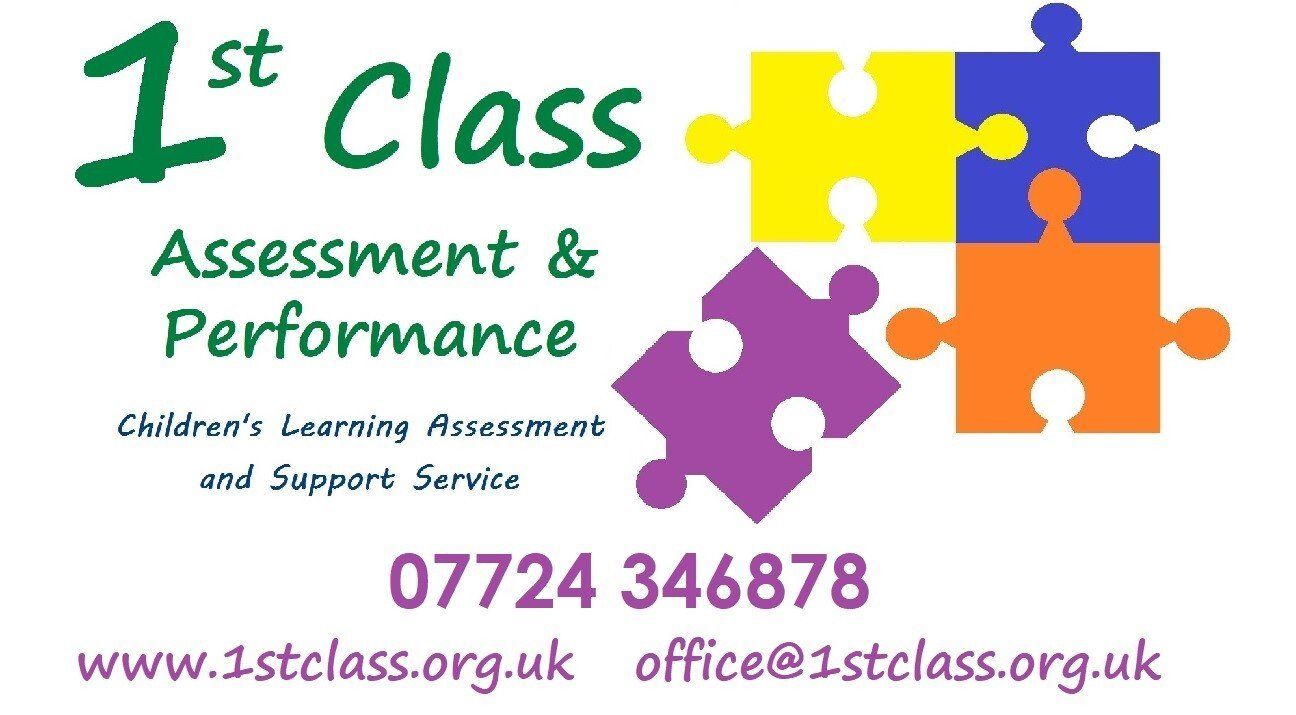Services
Contact Us
1st Class (Children’s Learning Assessment and Support Services) Assessments provides a select range of services in discussion and agreement with schools and parents. Services will mainly be in the form of learning assessments and consultations with parents and school staff to discuss the outcome of assessments and how the child’s learning and progress can be optimised. Visits can be any length of time, for example:
- a 1-hour review of a child’s progress,
- a 1½ hour assessment and feedback session,
- a half day (for example, classroom observation followed by one-to-one assessment with a child), or
- a full day (for example, classroom observation, assessment, lunch break and assessment scoring, and finishing with a 45-minute to 1-hour assessment feedback and consultation meeting with staff and parents).
Clearly, the more time used within a day, the more cost-effective it will be for a setting, therefore if multiple activities are required, it is advisable to use a half-day or full-day rather than several visits. This is particularly where forward planning is most beneficial, to arrange for several children’s assessment work to be carried out consecutively.
After reading through the services available, please see the end of this page for a link to the 1st Class referral form. Once downloaded, the PDF form can be completed on screen using the Adobe Reader Fill & Sign function.
Assessments
- Cognitive assessments – these evaluate the skills that underpin learning, such as processing, reasoning, working memory and verbal comprehension. Identification of a child’s strengths and needs can help staff plan for the child’s future teaching and learning, curriculum access and any necessary adaptations. Assessments can also take place for children who are high achievers, to identify specific areas of skill and how they can be supported to reach their potential.
- Attainment assessments – these can help determine the stage a child has currently reached in their learning, for example in literacy (reading and comprehension), mathematical skills, and their language comprehension skills. Information can be obtained such as standardised scores and age equivalents. This information can be used to plan for future progress and support packages. It may be that you want information about the achievements of an individual pupil, or a cohort of pupils to form a baseline with further assessments to monitor their progress over time.
- Speech and Language – whilst not taking the place of an assessment by the Speech and Language Therapist, I can provide assessments which can supply information about language and communication, verbal comprehension, and receptive and/or expressive language skills.
- 11+. As Lincolnshire is an area that utilises tests for grammar school places, assessment can help parents and/or schools obtain a profile of a child’s abilities to determine whether they believe sitting the tests will be appropriate for their child. Consultations can take place on how best to support any needs in school.
- High Achievers, High Learning Potential (More able, “Gifted & Talented”) – through experience of local authority Educational Psychologist work, I know that children who are high achievers rarely make the priority list for EP involvement, and when they do it is usually because teachers have identified a different need to be assessed (eg. they believe they may have ASD or formerly Aspergers). However, some Gifted and Talented children do not have other needs, but their learning profiles are just as important especially if they are not making the progress parents or teachers think they should, or if they are beginning to withdraw their engagement with classroom learning. Therefore it can be important to test their abilities and achievements to see exactly where their skills lie and how to extend them, and identify areas for support or catch up. By not being tied to local authority work and priorities, I have the availability to work with high achievers.
Consultation and Research
- Feedback / Consultation – this is a very important and vital part of the involvement with a child’s learning as it is where parents and staff (and the child themselves, if they are able) can share information about the situation, the child’s strengths and needs. My experience of child development and psychological approaches provides a problem-solving and solution-focused approach which enables schools to make action plans about how to further improve the child’s access to learning in school. Follow-up meetings can be arranged to review the progress and determine further actions where needed.
- Social and emotional needs – as part of a consultation approach, I can discuss difficulties that children may be having with social and emotional needs, meeting with the young people themselves and parents/carers and relevant school staff. There are some questionnaire-based assessments that can help identify particular areas of strength and needs. A whole-school approach can be used to determine appropriate reward systems for promoting positive behaviour across the school, ensuring children are encouraged to demonstrate positive behaviour rather than attending school in fear of sanctions and detentions (as can particularly happen at secondary school level).
- Observation – this is another very informative aspect of the process. Observation of a child in their setting provides a lot of useful information, such as how a child is managing to access learning in the classroom and how they are interacting during lessons.
- Research – having carried out research at a masters and doctorate level, as well as having worked for a local authority research and development team, I am ideally placed to plan, design, carry out and evaluate independent research investigations or surveys on any education/school related topic. This may include applying appropriate methodology to provide the information required, using existing or new data, evaluating the responses or outcomes, and linking research findings to school development.
Performance
I am passionate about music and drama and believe in the broadness of education: the importance of art, drama, music and other wider aspects of the curriculum being vital to children’s learning and experience of school. Taking part in drama activities or performances assists children to expand vocabulary, improve confidence and engage in creative expression. This is why I am keen to work with schools on introducing music and/or drama performance opportunities. See below for further information.
EHCP requests: As I am no longer working for the local authority, if you are hoping or intending to request an EHCP for your child or pupil following my assessments, you will need to check with your local authority whether or not they will accept the assessments. If, during our discussions on the work to be carried out, we agree that I will contribute to an EHCP request, it would not be to complete the Educational Psychologist’s report, but rather to provide the school with a summary of my assessment findings which can be used in their evidence pack for the EHCP submission. It is my assumption that, as my assessments will be similar ones or the same as local authority and other independent EPs, the information gathered in my assessment findings should be sufficient to demonstrate a child’s strengths and needs for the purposes of an EHCP submission. After the assessments have been done, the local authority may then require the assessment findings to be incorporated into an EHC advice section prepared by an Educational Psychologist contracted by the authority. It may be that your pupil has had prior EP involvement but you just need updated assessments in order to complete an EHC assessment request.
There are so many scenarios with regard to prior, current and future EP involvement with potential EHCP cases that it is best to contact me to discuss your particular circumstances. Please note, I do not offer Tribunal services.
I have an Enhanced DBS certificate and subscribe to the Update Service, therefore I can provide details of this during the process of arranging visits to schools. I am happy for settings to request an enhanced DBS certificate for their particular school prior to any visits, if they wish; please see the Terms and Conditions section. I am covered by Professional Indemnity Insurance and follow GDPR in line with the Information Commissioner’s Office (ICO). For further details, see the Privacy section or contact me.
Performance Opportunities in Music and Drama
Elizabeth is passionate about music and drama and believes in the broadness of education: the importance of art, drama, music and other wider aspects of the curriculum being vital to children’s learning and experience of school. This is where some children flourish and find that they are achieving, which is particularly important for those who may be struggling in academic subjects. Taking part in drama activities or performances assists children to expand vocabulary, improve confidence and engage in creative expression. Accessing opportunities for music and drama, and having the confidence to take part, is important not only in childhood but also for adults who may continue to enjoy the experience, and social aspects, of belonging to a music or drama group well beyond their school years.
Sadly, following the Covid pandemic, subjects like music and drama have been reduced even more than prior to the pandemic. To have these reduced, sometimes non-existent, is to deny some children their chance to shine. For children who are coping well with academic subjects, the arts help them to have time for enjoyment, relaxation, to develop new skills that they may otherwise not have known about. Schools have suffered so much with budget cuts that so little is now offered, within school or through lunch time or after school clubs. It seems that many children (especially since covid and school closures) are getting increasingly less access to drama or music in school. It can be difficult for many schools to appoint a music specialist amongst their staff team, making it difficult to create choirs or instrumental ensembles. There may be a short music session from a local authority contact once a week, often based around rhythm and drums. It’s fun to have chance to play the drums, but they’re not gaining much knowledge or experience of performing to an audience, both of which are important.
Before moving area, and before covid, my eldest child was fortunate to be in a school with an excellent music department which created regular opportunities for performance, including an annual music festival. It is something I would love to see other schools take on: the chance for those children who play an instrument, or who sing, or who would love to join anything that resembles a choir, to have the opportunity to take part in a music festival. How great would that sound to a Key Stage 2 pupil?... Choose a favourite piece of music, or sing in a choir; perform the music to a small audience of your friends, family and teachers, and gain a certificate and some kind words of encouragement. Adults often underestimate the resilience of children and how much confidence they can gain from additional opportunities to perform and shine. Far from being scary, for my son it was an extremely positive event, and those children I saw take part came away with an extra bit of confidence, pride and the knowledge that, even if they had been a bit nervous at the start, they could do it again in the future. That confidence built each time they performed. The music festival itself was only once a year – though it quickly came round and required organisation from the school and practice from the children and choirs! There were a few other concerts / performance events the rest of the school year to keep the momentum and interest going.
Music Festival opportunities
Elizabeth would be keen to work with schools on introducing music and/or drama performance opportunities at a low financial cost to the school. Elizabeth would work with the school on the organisation aspect and provide independent judging and feedback on the day itself.
Elizabeth says “I don’t claim to be a music or drama expert or teacher of these subjects, but I did reach grade 8 standard on the piano and clarinet!” Elizabeth has played in wind bands and orchestras in Manchester, and a concert band in Bournemouth. She now enjoys playing in an orchestra in Lincolnshire. She has taken part in numerous concerts at a variety of venues, from the Royal Northern College of Music to the bandstand at the Bournemouth Lower Gardens. Elizabeth has also enjoyed teaching the piano. She also has plenty of experience taking part in drama, plays, and providing stage lighting and she has directed children in numerous drama productions. She is highly capable of judging, appraising and providing positive feedback for individual musical performances, ensembles and drama performances. She can work with schools on how to organise a music or drama festival in advance, attend the event itself, and provide the all-important feedback and certificates.
For a discussion about arranging visits for any of the above services, you can contact 1st Class by phone, email or web contact form. Click here for the 1st Class Assessments referral form for the information that is helpful for me to receive in advance of any visits. Please read the FAQs and Terms and Conditions pages before sending in a referral form, especially with regards to parental consent.
Let's Talk
For any of the above services, please email or phone 1st Class Assessments, or use the Web Contact Form.


